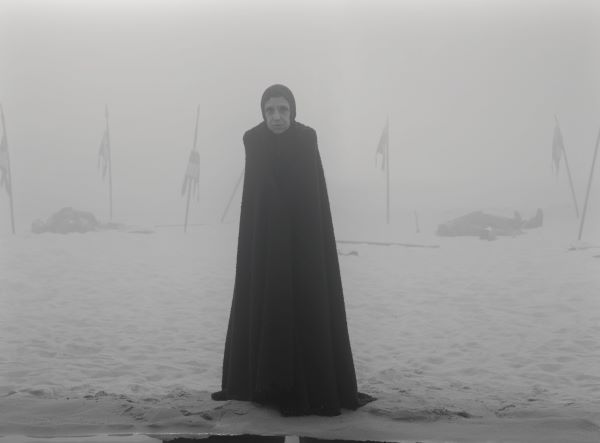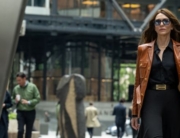What makes writer/director Joel Coen’s take on Shakespeare’s reticent, yet ruthless and ill-fated warrior king a different breed from so many other stabs at the Scottish tragedy on screen? Well, instead of Justin Kurzel’s realistic depiction of Michael Fassbender and Marion Cotillard’s evil deeds from 2015 or Roman Polanski’s 1971 on-location and brutal version with Jon Finch and Francesca Annis, Coen, in his first solo directorial outing, creates a blatantly artificial landscape.
This adaptation becomes a celebration of what filmmakers can achieve confined within a soundstage: a fog shrouded world of pseudo-medieval Scotland with modern surrealistic touches—with nods to the play’s mystical elements. Though it is violent here and there, the starkness derives from its black-and-white photography and the sense of desolation and isolation within the brutalist architecture of Macbeth’s fortress. Coen has said that he drew on filmmakers such as F.W. Murnau and Akira Kurosawa. For this viewer, the cinematography calls to mind the bellowing dark clouds of British cinematographer Guy Green’s work in David Lean’s Great Expectations (1946) and Oliver Twist (1948).
The choice of black and white creates an indelible and clear time and place. It also lends a harshness to an already cutthroat and supernatural tale. It’s a match between production design and story made in heaven, or in the case of Macbeth (Denzel Washington), who kills his way to the Scottish throne, perhaps hell. (If you thought the play was somber beforehand, this version will firmly affirm that opinion.) Additionally, the sound design plays an instrumental role in Coen’s wind-swept world-building.
The play is among the bard’s shortest, and this version comes in at a fleet 105 minutes. The translation to the screen is so faithful it could be used as a sort of cheat sheet to forgo reading the play. There are some alterations, perhaps most pointedly the rewriting of Macbeth’s line, “Bring forth men-children only: for thy undaunted mettle should compose nothing but males,” which has been changed to “for thy undaunted mettle should have composed nothing but males” as an acknowledgment that he and his wife (Frances McDormand) are now on the other side of middle age and their prospects of having children are in the past.
In a post-screening Q&A, McDormand said the focus here is on Macbeth’s marriage, but that is true to a limited extent. The events of the couple’s plan to murder King Duncan (Brendan Gleeson), and thus overthrow him and grab the crown, still dominate, as well as the couple’s guilt-ridden mental meltdown. Compared to the aforementioned screen versions, Coen emphasizes more the nightmarish, dreamlike world of mortals and black magic.
Most of the cast members give nuanced performances that are suited for intimate close-ups and would likely be lost in a midsize or Broadway theater—no declamatory speeches here. Both Washington and McDormand approach their monologues as though their characters are talking to themselves, figuring out for the first time what actions to take and the ramifications. Washington, in particular, nearly whispers throughout.
The one performance that matches the fantastical and other worldly atmosphere is by actor Kathryn Hunter, who personifies the three witches who set off the plot. The film jolts with energy whenever they are summoned or magically appear. Hunter steals the film, though she’s in it for no more than, say, 10 minutes. Because the witches foresee the future, they hold all the information that Macbeth craves, and they gleefully know it. Contorting her body as though she has turned into a raven or changing her voice since she’s possessed by multiple spirits, Hunter becomes an enigmatic imp, and the film’s best special effect.







Leave A Comment